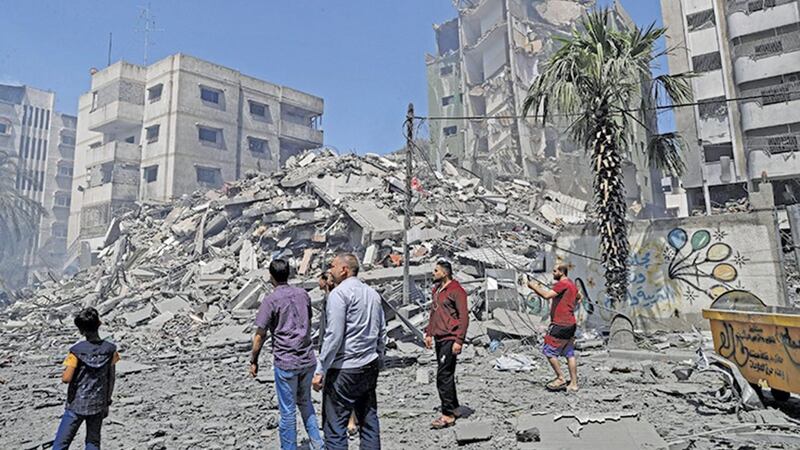THE old saying that “There’s always somebody worse off than yourself” comes to mind when comparing the situation in the north of this island with the latest developments in Israel and the Gaza Strip.
It’s certainly true that things are a lot calmer here than in those Middle East locations. But the conclusion of the inquiry into the Ballymurphy massacre of 1971 was a salutary reminder of how bad the situation became in this part of the world – and there have of course been riots in recent times.
I was in Israel/Palestine when the 9/11 attacks took place in New York and Washington. Indeed, I covered a press conference that the Palestinian leader Yasser Arafat gave in Gaza City later the same day. I still recall how his upper lip quivered like a leaf as he answered reporters’ questions. Presumably this was because there were initial suggestions that the attacks on the World Trade Centre and the Pentagon had been the work of Palestinians.
These suggestions were quickly dismissed by authoritative sources. If they had been found accurate, the rest of the world would have found it very difficult to express any sympathy for the Palestinian cause thereafter.
In his role as 42nd US President, Bill Clinton put a lot of effort into promoting the Irish and Middle East peace processes, with great success in the former and little lasting progress in the latter. I have it from a well-placed third-party source that he said to a certain Sinn Féin leader who shared a surname with two of Clinton’s predecessors (second and sixth presidents): “The difference between you and Arafat, Gerry, is that you delivered!”
A few days after 9/11, I secured an interview with Benjamin Netanyahu, now Prime Minister of Israel (at this writing anyway) but at that time out of office. In a book of his, published in 1995, he had actually warned against subversives planting a nuclear bomb in the basement of the World Trade Centre.
He told me he didn’t believe in making deals with those he regarded as terrorists. For him, it wasn’t a question of addressing their grievances: the fight against terrorism was the same as the fight against the Nazis. “You did not care what the Nazis’ grievances were,” he said in the interview.
Six months later, in March 2002, I was back in the same part of the world and wrote in a news report: “Hell is Gaza and Gaza is hell.” I had just been to a hospital morgue where the body of a 21-year-old Palestinian lay on a metal platform. I can still see the gaping bloodstained bullet-hole in his chest and another one in the right shoulder. The Israeli military said he had been shot because he was behaving suspiciously at a border crossing which was close to a Jewish settlement. Although he was unarmed, the Palestinians ended up portraying him as a freedom-fighter and his body, draped in a green Hamas flag, was brought to the mosque. His little brothers, aged ten and eleven, held M-16 rifles in their hands as they were carried aloft.
President Clinton’s efforts to bring an end to that conflict may have been unsuccessful but the US continues to be a major influence in the region. Senator and former presidential candidate Bernie Sanders wrote in the New York Times last week that whenever Israel, “with its enormous military power”, responds to rocket attacks from Gaza, both Democratic and Republican administrations invariably state that the Israelis have the right to defend themselves. He notes also that the US supplies almost four billion dollars a year in aid to Israel.
Sanders doesn’t dispute Israel’s right to self-defence or to protect its people, but he wonders why the question is almost never asked: “What are the rights of the Palestinian people?” Whilst agreeing that “Hamas firing rockets into Israeli communities is absolutely unacceptable”, he points out that today’s conflict began over intensified efforts to evict Palestinian families in the Jerusalem neighbourhood of Sheikh Jarrah.
Senator Sanders, whose family background is Jewish, calls for a more even-handed attitude: “This approach must recognise that Israel has the absolute right to live in peace and security, but so do the Palestinians.” His article concludes with a new twist on a popular political slogan: “Palestinian lives matter.”
Email: Ddebre1@aol.com; Twitter: @DdeBreadun








